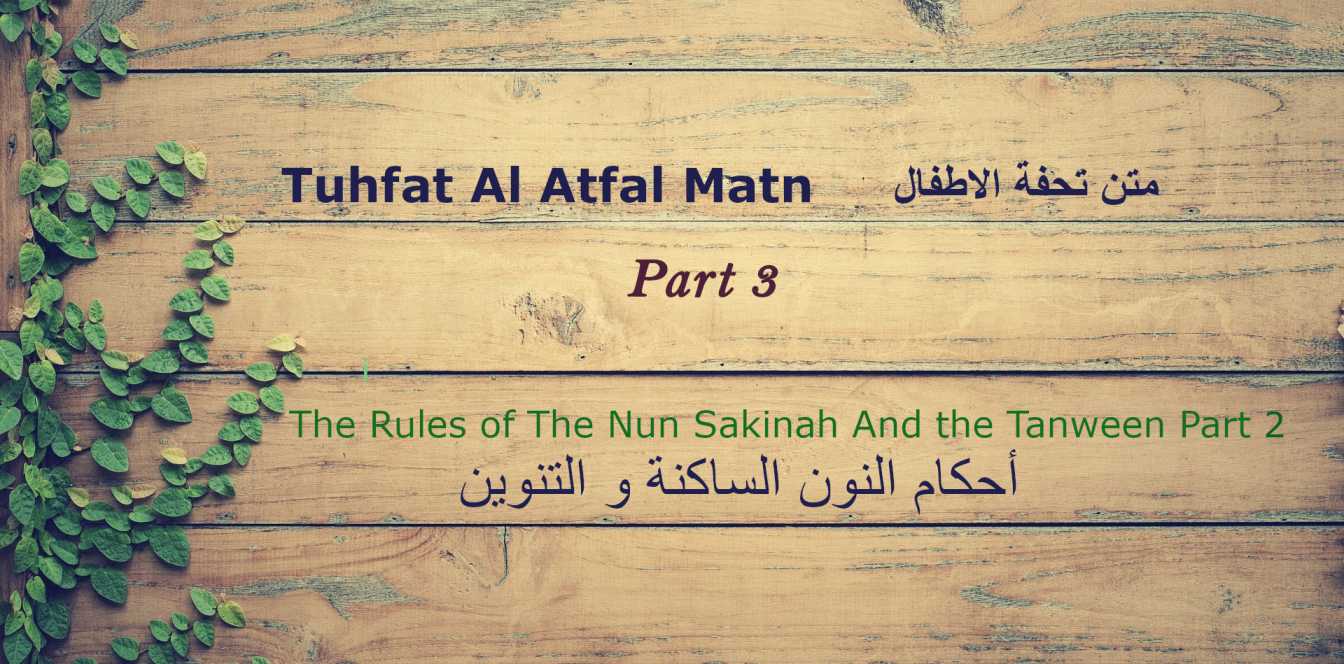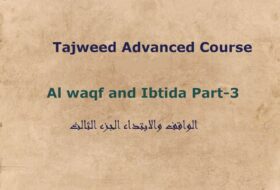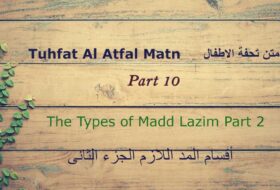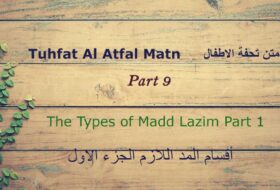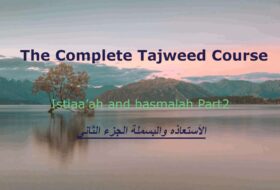The Rules of the Noon Sakinah and the Tanween Part 2
See:-> Part-1 Part-2 Part-4 Part-5 Part-6 Part-7 Part-8 Part-9 Part-10 Part-11
وَالثَّـانِ إِدْغَــامٌ بِغَيْـرِ غُنَّــــهْ فِـي اللام وَالــرَّا ثـُمَّ كَرَّرَنَّهْ
وَالثَـالثُ الإقْـلابُ عِنـْدَ البَــــاءِ مِيمــاً بِغُنَّــةٍ مَــعَ الإِخْفَاءِ
وِالرَّابعُ الإِخْفَــاءُ عِنْدَ الفَاضِـــلِ مِنَ الحُـرُوفِ واجبٌ للِْفَاضِــلِ
فِي خمْسةٍ مِنْ بعد عشْرٍ رمْزُهَـــا فِي كِلْـمِ هـذا البَيْتِ قَدْ ضَمَّنْتُهَا
صِفْ ذاَ ثَنَا كَمْ جَادَ شَخْصٌ قَدْ سمـاَ دُمْ طيَّباً زِدْ فِي تُقـيً ضَعْ ظَالِماَ
TEXT: 12
وَالثَّـانِ إِدْغَــامٌ بِغَيْـرِ غُنَّــــهْ فِـي اللام وَالــرَّا ثـُمَّ كَرَّرَنَّهْ
VOCABULARY:
وَالثَّـانِ – the second
إِدْغَــامٌ – idghaam
بِغَيْـرِ – without
غُنَّــــهْ – ghunnah. Ghunnah is the nasal sound found in every Noon and Meem.
فِـي – in
اللام وَالــرَّا – Laam and Ra’aa ( ل – ر ) letters
ثـُمَّ – Then
كَرَّرَنَّهْ – to repeat. It refers to the Sifah of takrīr in the raaʾ.
TRANSLATION:
12. And the second (type) is idgham without ghunnah in laam and rāʾ, then observe takrīr (of the raaʾ) / and its code is( ل ر ),so know it.
COMMENTARY:
In line ten, the author mentions that the six letters of يَرْمُلـُونَ is divided into two types: idgham with ghunnah and idghaam without ghunnah. In this line, the second type is explained, i.e. idgham without ghunnah. It will take place in the lām and raaʾ (ل ر )
He also states that takrir should be observed in the rāʾ. This does not mean that takrir should be made apparent and clear, but that it should be hidden. The author mentions this because, due to the idghām being made into the raʾa, it becomes Mushaddad (doubled) and carries more chance of the takrir becoming apparent.
In the second print the author mentions an easy way for us to remember the letters of idghām without ghunnah via the code of (ل ر )
TEXT: 13
وَالثَـالثُ الإقْـلابُ عِنـْدَ البَــــاءِ مِيمــاً بِغُنَّــةٍ مَــعَ الإِخْفَاءِ
VOCABULARY:
وَالثَـالثُ – third the
الإقْـلابُ – iqlab literally means to change something.
عِنـْدَ – by
البَــــاءِ – Ba’a letter (ب)
مِيمــاً – Meem letter (م)
بِغُنَّــةٍ – Ghunnah is the nasal sound
مَــعَ – with
الإِخْفَاءِ – ikhfaʾ literally means to hide and conceal.
TRANSLATION:
13. And the third (rule) is iqlشb (changing the Noon Saakinah or Tanween ) by the baʾ to a mim, applying ghunnah with ikhfaʾ.
COMMENTARY:
The third rule regarding the Noon Saakinah and Tanween is iqlab, which takes place when theNoon Saakinah or Tanween is followed by a ba.
The author outlines three applications in this verse. Firstly, iqlab, which is the changing of the Noon Saakinah or Tanween into a mīm. Secondly, that it will be read with ghunnah, and thirdly, making ikhfaʾ (concealing) of the mīm sākinah. Only with all these three applications is the rule of iqlab read correctly.
TEXT: 14
وِالرَّابعُ الإِخْفَــاءُ عِنْدَ الفَاضِـــلِ مِنَ الحُـرُوفِ واجبٌ للِْفَاضِــلِ
VOCABULARY:
وِالرَّابعُ – the fourth
الإِخْفَــاءُ – first of the two mentioned above), is hiding
عِنْدَ – over
الفَاضِـــلِ – remaining
مِنَ – from of
الحُـرُوفِ – letters, plural of حرف
واجبٌ – obligatory, compulsory
ل – For
فَاضِــلِ – ) Second) – the distinguished i.e. the one who has excelled or it superior in tajwid. It is read exactly the same as previously, but in this context its meaning will differ from the first.
TRANSLATION:
14. And the fourth (rule) is ikhfaʾ by the remaining letters, which is compulsory on the distinguished.
COMMENTARY:
The fourth rule is ikhfa, which takes place if the Noon Saakinah or Tanween meets any of the remaining letters i.e. excluding the six letters of the throat in which iṭḥ-har is made, the six letters of idgham and the ba of iqlab.
In the following two lines the author mentions the remaining letters.
TEXT: 15
فِي خمْسةٍ مِنْ بعد عشْرٍ رمْزُهَـــا فِي كِلْـمِ هـذا البَيْتِ قَدْ ضَمَّنْتُهَا
VOCABULARY:
فِي – in
خمْسةٍ – five
مِنْ بعد – and , plus
عشْرٍ – ten
رمْزُهَـــا – its code / combination (to remember the remaining letters)
كِلْـمِ – from كلمات which means words. Here it refers particularly to the first letter at the beginning of the words (in the following line). It can be read with a fatḥah on the kaf or a kasrah.
البَيْتِ – line, verse (of poetry)
ضَمَّنْتُهَا – I have gathered it (the combination of these 15 remaining letters).
TRANSLATION:
15. In five after ten (fifteen letters), its combination in (the initial letters of) the words of this (following) line I have indeed gathered it (these letters).
COMMENTARY:
The author explains that he has gathered the remaining fifteen letters of ikhfaʾ in the initial letters of the following line. Thus, if a student has Memorised the following line, then he has knowledge of all fifteen letters of ikhfa.
TEXT: 16
صِفْ ذاَ ثَنَا كَمْ جَادَ شَخْصٌ قَدْ سمـاَ دُمْ طيَّباً زِدْ فِي تُقـيً ضَعْ ظَالِماَ
VOCABULARY:
صِفْ – describeِ
ذاَ – َholder, possessor
ثَنَا – praise
كَمْ – how (in asking a question)
جَادَ – good
شَخْصٌ – a person
سمـاَ – َhigh, elevated. Here it refers to a person of eminence.
دُمْ – alwaysُ
طيَّباً – good
زِدْ – increase
تُقـيً – (consciousness Allah (piety
ضَعْ – leave
ظَالِماَ – oppressor, wrongdoer
TRANSLATION:
16. Describe the possessor of praise (he who truly deserves praise). How generous is a person who has attained status? Always be good. Increase in piety. Leave an oppressor.
COMMENTARY:
To start with, the verse bears meaning and gives advice. However, the object is that the initial letters, at the beginning of each word, constitute the letters of ikhfa. The ص of صف, ِthe ذ of ذا ,َthe ث of ثنا .etc
Al ith har ash shafawi
the-meeting-of-two-letters-part-1-introduction

